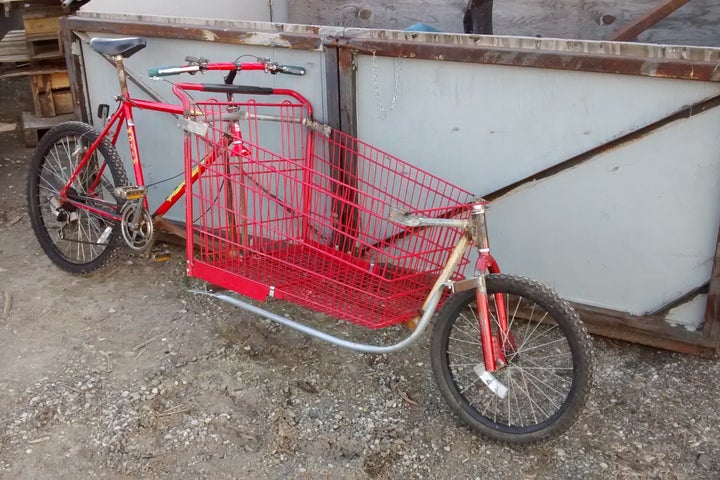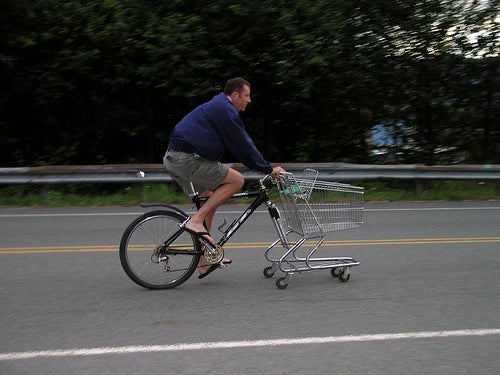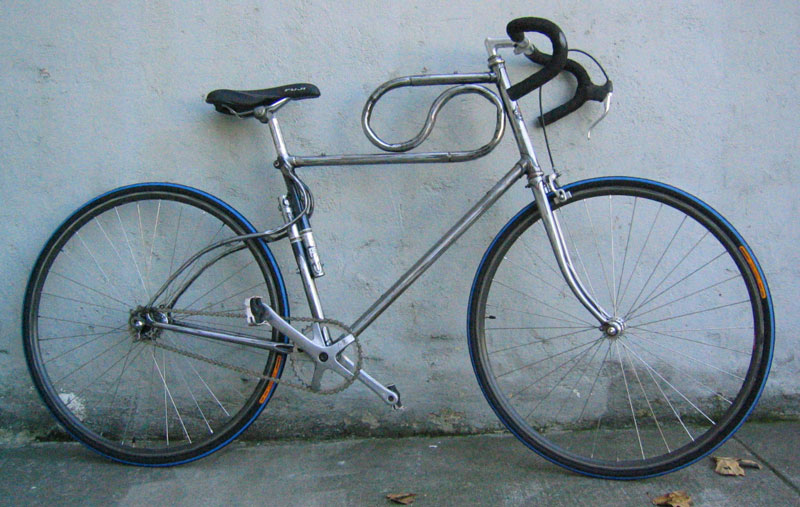When I talk to bicyclists about bikeshare, sometimes they say, “I don’t need bikeshare. I have a bike. I love my bike.”
I get it. You love your bike. It's the perfect bike for you. Why would you need bikeshare? I love bikes too. Bikes are beautiful. There are lots of bikes to love--old ones, new ones, fast ones, slow ones,
To be clear, bikes aren't people, and bicycling isn't sex. But it's a seductive lens.
What is monogamy, and how do love and commitment compare between people and bikes?
How is desire informed for each?
What is transformative desire? How do we radically love them?
The Monogamy Dance
In my mid-40s, I’m surrounded by all ages of people entering, enjoying, exiting, or avoiding monogamy. Considering monogamy relationally, rather than institutionally, I think of it as an intimate dance where two people try to keep dancing with only each other. Sometimes one person leads; sometimes the other. As you dance, you figure out how to move together, communicating what you like and don't like. You attempt to read the other person’s moves while you also try to inspire and make room for each other to keep the dance going.
If it sounds exhausting, that's because it is. But it can also be exhilarating if it’s going well. It’s a labor of love. Sometimes the dance is fun, sexual, and adventurous. It can be dinner and drinks, a visit with the in-laws, something new in bed. Other times, it can be a scary trip to the emergency room, arguing and forgiving each other, or trying to fall asleep knowing the other person is still angry. A good dancing pair plans on how to keep dancing into the future.
Hopefully they enjoy it. There are other dance floors and other dance partners to choose from. Some are dancing around you on their own or in larger groups. At any point, one or both in a couple may decide they don't want to do the dance anymore. Then they should stop. No one wants to be dragged, or be dragging someone else, around the dance floor.
My parents separated when I left home for college. Later, they got back together. You might get tired of your partner and need a break. Maybe you’ll dance with each other again. Maybe you’ll dance with more people, or just by yourself. Autosexuality might be an even truer form of monogamy. Dancing with yourself can be very satisfying. Riding a bike could be seen as a satisfying intimate solo dance.
Cheating on Your Bike, Bikeshare and Ownership
In monogamy it's cheating if you have sex with other people. If you want to do a different dance, like nonmonogamy, or polyamory, you owe it to your partner to figure out what’s next. Riding a different bike doesn’t count as cheating, but a committed relationship to a bike or a person might feel similar.
You love them. But sometimes you love them less. And do they love you back the same all the time? Sometimes they break down. They may need a quick fix, but you don’t have the time or energy to handle it. They can become physical and emotional baggage. Maybe you don’t want to be with them everywhere all the time, up and down stairs, out and about, onto buses and trains.
You stick with them because you’re committed, and they’re beautiful. What about others? You might fall in love with something new. Or someone else might have eyes for the object of your affection? What if they’re stolen away? Nothing keeps another person from being as enamored with your muse as much as you are. What you desire, others will also desire!
Bikeshare is useful here. It’s conveniently available, ready to ride without guilt or baggage. We hook up, ride around, have fun, and then we're off on our separate ways, the bike to the next rider and me to the next bike. Bikeshare doesn’t get mad that I love my own bike. It's chill. Bikeshare is just glad I’m riding. It's okay if it isn't the only bike I ride. It's okay if I don't want to always ride it. Maybe my bike at home is glad I’m riding and it gets to rest. It eases the pressure from my intense burning bike love.
Bikeshare becomes a kind of nonmonogamy with bikes. Monogamy is often confused with mutual ownership. The end and beginning of monogamy are often punctuated by a transition into or out of shared ownership.
That's mine; this is yours. - RIP Bruno Kirby, Carrie Fisher, and Nora Ephron
Bikeshare challenges traditional ownership. It feels foreign because there aren’t many other systems where people have as frequent intimate casual use of large machinery. The next large-scale sharing economy example is the public library. After that, the next example might be grocery carts.
The Politics of Desire
In The Right to Sex, Amia Srinivasan interrogates the confluence of misogynistic vectors, like the manosphere, incel culture, mainstream pornography, and established patriarchy. These align to amplify and normalize violence towards women from men with the misbelief they have “The Right to Sex.”
Srinivasan points out how sexual desire is socio-politically informed, based on power and beauty standards, which are mostly constructed around traditional hierarchical systems like racism, class, heterosexism, abelism, ageism—dimensions of identity.
Beauty privilege necessitates a beauty-underprivilege. And Srinivasan touches upon this in a reply to her critique, which complicates the politics of desire as a reality for the undesirable.
One of the more arresting emails I got about ‘The Right to Sex’ was from a man from Sydney — a multicultural city in a country notorious for its racism. Originally from Sri Lanka, he was adopted by two white parents. ‘I reassure you,’ he said, ‘that I’m no psychopath like that mixed-race kid who underpins your thesis and massacred those poor souls after rejection based allegedly on his race. I’m rational enough to accept my fate and try and make the best of my short existence.’ He said that it was heartbreakingly difficult to date as a non-white man. He said that dating profiles, including those of Asian women, list ‘Caucasian’, ‘white guys only’ and ‘no Indians’ as their preferences. He said that he had once posted a critical comment on a YouTube video called ‘Why Filipinas like White Guys’, and that a white woman had replied ‘Suck it up, the truth hurts.’ He said he was profoundly lonely, as were his other Asian friends, and that he had taken up various hobbies ‘to stymie the spectre of undesirability’. He said that many ‘white-guy-ethnicgirl relationships must be love’ but asked whether some were not 'a re-enactment of colonial conquest and rescue’. ‘And if it is?’ he said, ‘Well that’s their right. It’s consensual. Us ethnic guys just have to suck it up. Besides, if we were good enough they’d stay with us. Love is immune from scrutiny, even when it’s political.’ He said, ‘I certainly don’t feel the right to Sex, nor do I feel the right to Love. But that doesn’t mean it doesn’t hurt.’ He said, ‘I suppose I have the right to feel hurt.’ He said, ‘I haven’t come across many women, ethnic or otherwise, that acknowledge what us Ethnomen face. They just think we’re all backward. Sophistication is a province only found in Caucasia.
As an Asian American man, this resonated a lot. It plainly shows how there is a human desire to be desired. An unresolved tension emerges. The politics of desire works by objectifying more vulnerable demographics towards abuse. At the same time, undesirability can become psychosis, driving a person to depression or worse.
The safest conclusions regarding desire, whether sexual or platonic: No one has the right to be desired anymore than they have the right to sex; it feels good to be desired—so long as it isn’t manifested as violence or subjugation (which it often is); and it’s especially nice when desire is mutual.
Srinivasan arrives at the politics of desire in a coda. Where do we go from there? The corollary questions are entangling. Since no one has the right to sex or to be desired, and since the politics of desire are fraught with problematic standards, what if anything can be constructively said about who/what we should desire? What is revolutionary desire? How do we desire transformationally?
Reflectively, useful questions arise from Srinivasan’s earlier chapters. If misogynistic vectors amplify and perpetuate status quo politics of desire, how do we break the cycle?
How do we mind the context from which desire emerges? What parts are hegemony, and what is desirable about other parts?
How do we rewire who/what we desire?
What porn aren’t we watching?
Answering these questions could be fraught and thorny, implicating and loaded, possibly ugly and vulnerable. Thank goodness bikes aren't people and bicycling isn't sex.
Traditional Bike Desire
Historically, bicycle marketing leans into the tour-de-france or cargo bikes, a combination of efficiency and utilitarianism. These are desires we’ve internalized from cars, and general transportation culture. We are told that vehicles are fundamentally freedom and virility.
The Roots - marketing is increasingly hypersexualized.
This predictably culminates in the e-bike: Harder Better Faster Stronger. Socially constructed desire for eBikes is mostly rooted in transactional exchange, maximizing output while minimizing individual time and energy cost.
Radical Bike Love
There
is a sad alternate future we should try and avoid where bikeshare is only for rich people who
don't care how much it costs, simply that it meets their desire for speed
and efficiency. The privilege to not worry about storage, theft, or maintenance becomes priced at a premium for the elite who can afford it.
But efficiency, speed, and utility are only part of the bicycling experience. What’s desirable about other parts?
A wide variety of bikes appeal to us for a multitude of reasons. Bicycling isn’t simply a mode of efficiency. It can be one of style, playfulness, and alternative function. It can provide a new vantage point or make you laugh. It can be a form of protest, or a celebration of reuse.
Radical bike desire means embracing various bikes for all they are and deprioritizing the economic transportation framework of time/money-based efficiency oriented around speed and power.
Bicycling is appreciation of neighborhoods you ride through. It's the fun of riding in a group. It's the refreshing resonance of childhood joy. It's an opportunity to slow time down and enjoy connection–to prolong the present, knowing you'll be in the future somewhere, looking back at this momentary triumphant feeling. It's also the physical labor that moves you slowly up the mountain, every push helping you grow stronger and simultaneously more exhausted. Time well spent.
Nonmonogamy Bike Desire: A Coda
On the subject of pleasure and speed, circle back to sexual desire. Musically, sex is sung of slowly, with SLOW JAMS. Sex and Sensuousness are something to enjoy stretched out in time, worth the wait, a thing in which time ceases to matter.
Boyz II Men - Let's go slow. I ain't got no where to go.
In bikeshare, the “classic" regular pedal bikeshare bike is often criticized as heavy and slow. It doesn't respond like a light road frame or give you cyborg powers like an e-bike, but it succeeds in reminding us about the best part of bike love--the part where you are the engine, and your muscles move you as much as your will.
Bikes aren’t people, and bicycling isn't sex, but the joy of bicycling comes from how it celebrates humans, the way that love and desire should too.
Dirty Old Bikes
A dirty old bike is a glorious thing.
Rusty but rolly, when ridden, it sings:
Rusty but rolly, when ridden, it sings:
"Hey all you shiny bikes come out to play.
Your owners must love you and clean you all day.
Flash me those parts with a fresh virgin sheen
You may think you are human but you're just a machine.
You were made to be ridden, to get dinged up and scratched
Though your owners fondle you like a chick that's just hatched.
Your metal and paint will grow old and decrepit
Especially because your rider's intrepid."
A dirty old bike is proud and it's zealous.
It stares at the young bikes, and ages ever jealous.






No comments:
Post a Comment